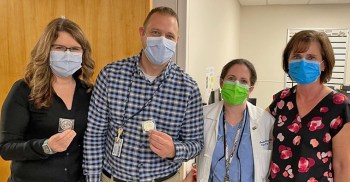The Surgical Pause evaluates Veteran frailty to mitigate frailty-associated risk and clarify Veteran goals. This ensures expectations are realistic and everyone understands what “success” after surgery looks like.
Identified as a Promising Practice in the 2019 VHA Shark Tank Competition, The Surgical Pause has improved the lives of Veterans.
In some cases, the Surgical Pause can offer alternative treatments to surgery to increase survival rates among high-risk Veterans.
Using the Risk Analysis Index developed by Dr. Daniel Hall, staff surgeon at Pittsburgh VA, health care professionals can measure Veterans’ frailty in 30 seconds. The index flags Veterans who are at a high-risk for complications after surgery.
These complications can include long hospital stays, readmissions for unanticipated problems like blood clots or pneumonia, long-term institutionalization and even death. The surgical team can then work with Veterans to identify alternative treatment that mitigates the risks of surgery and aligns with their overall life goals.
The Surgical Pause
Research shows that even “minor surgery” can be risky for frail Veterans. One in three Veterans considered very frail do not survive past the six-month mark after surgery. The Surgical Pause encourages transparent communication about the risks of recovery or loss of independence after surgery, empowering patients to consider non-operative management strategies.
For those who elect surgical intervention, preoperative exercise training for as little as 3-6 weeks before surgery may improve outcomes by increasing physiologic reserve. (The capability of an organ to carry out its activity under stress is known as physiologic reserve.) By bringing additional resources to such frail patients, the Surgical Pause improves outcomes and adds value.

Left to right: Amy Tyson, Dr. Bradley Schmit, Lindsey Goldstein (Chief of Surgery) and Dr. Ilona Schmalfuss (Chief of Staff)
Interdisciplinary boards can pool expertise and wisdom from multiple specialists to create a care plan that best fits a high-risk Veteran. Health care professionals can assist surgeons and primary care doctors in ensuring the recommended treatment matches patients’ goals, even when treatment does not include surgery.
North Florida/South Georgia VA sees measurable Veteran impact
The Surgical Pause team has worked closely with VHA Diffusion of Excellence to replicate this promising practice to over 50 VA Medical Centers. After North Florida/South Georgia VA implemented the Surgical Pause, they noticed steady and significant reductions in complications and death after surgery.
Comparing medical data to their peers, North Florida/South Georgia VA has moved from an unusually high mortality rate to one on-par with national and regional peers. Similar improvement was observed for postoperative complications that reduced from the national average to an unusually low rate, compared to peers.
Danielle Hagan, from the VHA Diffusion of Excellence, noted that the Health System “is a major player in this space. They have experienced much success because of their local leadership buy-in and the commitment the surgical leads, Amy Tyson, advanced nurse practitioner, and Dr. Bradley Schmidt, general surgeon, have made to this practice.”
Symposium to feature talks on implementing Surgical Pause
Coming in June: The Surgical Pause Symposium hosted by VA Innovation Ecosystem and VA National Surgery Office. The symposium will feature talks on implementing the Surgical Pause, overcoming barriers and identifying motivators, and building out local frailty programs.
The principal investigator of the PAUSE Trial will share how her team is convening a multidisciplinary “Pause Board.” This board will discuss and optimize patients treated in Palo Alto, Nashville and Houston.
Topics in this story
More Stories
Study underscores important role COVID vaccination can have in protecting Veterans from infection and reducing long-term health consequences
Columbia VA’s robotic surgery teams completed their 800th robotic surgery and are on schedule to hit 1,000 by the end of the year.
In a decentralized clinical trial, Veterans can participate from their own homes or local VA instead of having to travel to a research site.







I have 2 lungs with getting worst as time moves forward I need a double transplant and a pause is not what I need.
This idea and practice of surgical pause sounds great but what can be done in cases such as spinal surgery that’s needed in order for the veteran to have a normal life and being able to walk without using a cane or a walker.